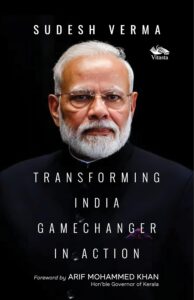
Book Launch
Book: Transforming India: Gamechanger in Action
Category: Non-Fiction
Writer: Sudesh Verma*
Price: Rs. 495
Publisher: Vitasta Publishing Pvt. Ltd.
Available for pre-order on Amazon
Journalist, lawyer, political analyst, and author, Sudesh Verma’s prophetic vision, penned in his groundbreaking 2014 book Narendra Modi: The GameChanger, has been vindicated. His keen interest in Modi’s governance model led him to join the BJP in 2015, where he serves as the party spokesperson.
Now in his latest book “Transforming India: Gamechanger in Action”, published when India is in the midst of the parliamentary elections, Sudesh, highlights nine years of Narendra Modi’s achievements.
Commenting about the book, journalist and former union minister MJ Akbar wrote, “The Narendra Modi chapter of Indian history is still unfolding, but a decade is long enough for a rational examination and analysis of how precisely Prime Minister Modi has elevated the India he inherited into the India of the Indians’ dreams”.
Sudesh brings a wealth of experience to his writing. For over two decades, he worked with prominent organizations such as Deccan Chronicle, Business Standard, Statesman, and NewsX, analysing Indian politics and governance. Akbar calls him Modi’s disciple, ” but one with exceptional knowledge and talent”. According to him, Sudesh is an important interlocutor of this era because he infuses empathy into a treasure house of knowledge.
In an interview with Global Bihari, Sudesh candidly explains why Modi is also a hated figure, and who are the people who hate him.
Sudesh points out that among the many stories and accomplishments detailed in his latest book, one particular anecdote stands out for its insight into Modi’s leadership style and mindset.
“This excerpt underscores Modi’s remarkable ability to derive profound insights from the most mundane of moments. It’s a testament to his leadership philosophy: every small event is a potential teacher, urging us to remain receptive to the wisdom that surrounds us, even in the most unexpected corners. I believe this story encapsulates the essence of the book and offers readers a glimpse into the depth of Modi’s character and leadership,” he says.
Following is the excerpt:
Mann Ki Baat: Transformational Instrument
Modi had realised the effectiveness of radio when, during his visit to Himachal Pradesh in 1998, he stopped for tea at a stand-alone tea shop. The person offered sweets to him and asked him to wait for the tea. Modi asked him what the matter was–was there a celebration? When prodded further, he cited the reason for his happiness. India had exploded the nuclear bomb, and he asked Modi to listen to the radio. Such was its impact.
Mann ki Baat achieved phenomenal popularity since it touched upon issues concerning the common man. It focussed less on the government’s achievements and more on giving solutions to the problems people faced in their day-to-day existence. For example, the talk focussed on championing the cause of clean India, the significance of Swadeshi and khadi, love for and the need to protect nature, fighting drug menace, examination fever and facing it boldly, the importance of Indian breed dogs, not bargaining with poor street vendors, and acknowledging creativity and innovation.
Since the address follows an informal, conversational style, Modi needs no preparation, nor is the text a prepared one. The feedback, points and issues raised by the people through various platforms, such as ‘mygov’, ‘Narendramodi app’ and toll-free number (1800-11-7800), are read by the Prime Minister during his travels to understand the feelings of the senders. He easily identifies with the person asking questions and their ambience because he has travelled all across the country during 45 years in the eyes of the public. Once he decides to take up the issues, the flow is spontaneous. His ability to connect and empathise with people comes in handy.
It was difficult to think of a name for a programme of public connect. Some suggestions were sought from people through the ‘mygov’ platform. Various names cropped up, such as ‘PM Ke Sath Rubaru’, ‘Varta Modiji Ke Saath’ and ‘Modi Vani’. When these names were proposed to him, he simplified the task by saying there was not much to think of. ‘Arre isme kya hai? Kaho kuchh halki fulki mann ki baatein karunga’ (Just say that it will be some light hearted talks in the programme). The programme was thus named Mann ki Baat (Musings Straight from the Heart). It was decided to air the programme once a month at 11 am. When the programme beamed its 100th episode, it had already become a mass movement. History was made when it was broadcast live at the United Nations headquarters in New York. Modi described it as his spiritual journey, where the broadcast expressed the feelings of crores of Indians and ensured that he was never cut off from them. ‘For me, Mann ki Baat is not a programme, for me, it is a matter of faith, of worship, or Vrat. Like when people go to worship God, they bring along a thaal of prasad. For me, Mann ki Baat is like a thaal of prasad at the feet of God in the form of janata-janardan, the people. Mann ki Baat has become a spiritual journey of my being.’
Such profound thoughts reflect his humility and spiritual side. Swami Vivekananda believed in the principle of ‘service to man is service to God’, and the Prime Minister has realised this in his spiritual journey.
Various world leaders have appreciated this instrument of transformation. Tesla CEO Elon Musk acknowledged PM Modi’s communication skills and said, ‘Prime Minister Modi’s connect with the people through his radio show and social media is simply amazing!’ Barack Obama, during his visit to India in 2015, lauded the format of Mann ki Baat and described it as ‘a wonderful way to connect with the people’. ‘I think it’s a great idea for any leader to find ways to speak directly to the people, to bypass the filter of the media and the bureaucracy’, he added.
– global bihari bureau






